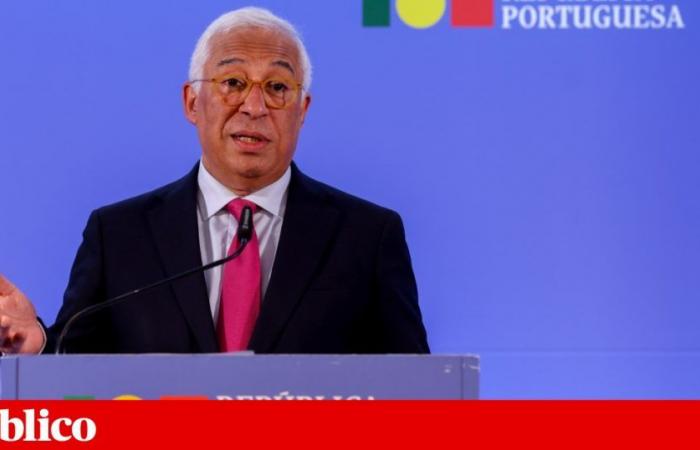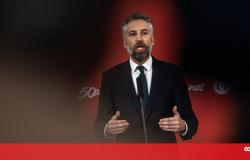
An assessment of eight years with “multiple crises” that were resolved: this is how António Costa, outgoing Prime Minister, began the press conference this Wednesday — which he said was his first step towards “exiting the scene” -, in which he recalled dozens of measures taken by his governments and many other “advances” of the country in eight years of Socialist Party government.
From the official residence of São Bento, Costa made, over the course of more than an hour, a comparison between 2015, the year in which he began his first term as prime minister, and 2023, the time in which he presented his resignation to Marcelo Rebelo de Sousa, following an investigation into the lithium and hydrogen businesses. As he himself described, he wanted to present “results” from his 2930 days in office.
“When we took office, in November 2015, the country’s main concern still had to do with the situation of the financial crisis, both in the financial system and public accounts. Eight years later, we can say that, fortunately, we have a stabilized financial system . The public bank — which many believed should be privatized and which was impossible to capitalize successfully — is today a bank that is not only solvent, but also generates due benefit for the Portuguese economy and Portuguese citizens”, began the Prime Minister outgoing, with the pose of a statesman, at the same time that in Parliament the crisis of the election of its president was still going on.
JOSE SENA GOULAO / LUSA
Despite the “very serious” covid-19 crisis, the State “was able” to maintain a “constant trajectory” of improving public accounts. “We went from a situation of excessive deficit in 2015 to a situation of positive balance in 2023. We have already managed to recover from the impact of the pandemic on our public accounts and we closed 2023 with a positive balance in the budget and with a reduction in the debt ratio”, he pointed out .
The official stated that the second major and “dramatic” crisis that his Government had to face was related to the 2017 fires. He guaranteed that the response given after 2017 in the restructuring of the Civil Protection system or in the budget reformulation allowed the results to over the following six years were “different”, highlighting two important facts.
“If we add up the area burned in the six years between 2018 and 2023, the total is 60% of what was the area burned in 2017 alone. The annual average in 2018, 2019, 2020, 2021, 2022, 2023 was 10% of what was the area burned in 2017. I would like to emphasize that, despite this improvement, it is important not to forget that we are a country with a high risk of forest fires and that climate change is a reality (…). These good results are not what should make us let our guard down”, he said.
The pandemic, which profoundly affected two of Costa’s eight years of government, was the third major crisis he mentioned. “Portugal had a performance that I believe is worthy of note. We were the first country in the world to achieve a vaccination coverage rate of 85% of the population. The effort to support the economy and families allowed us to be one of the countries the world that came out of that pandemic situation better.”
The exit, as he recalled, was “short-lived”, as another crisis followed: the war in Ukraine, which worsened a situation that already stemmed from the pandemic, with the disruption of supply chains and which led the country “to biggest inflationary crisis in recent years”.
“Nothing is more difficult than managing an inflationary crisis because, between the measures that impact prices and the measures that seek to improve income to cover this increase, the risks of avoiding an inflationary spiral are very great,” Costa further stated.
There was also time to remember the European Central Bank’s decision to significantly increase interest rates. “The fall in inflation has led, in recent months, to a stabilization of interest rates and, without being overly optimistic, I think we can anticipate that the ECB’s next decisions will not be to raise them but, I don’t know when, they will start- is on a path of progressive reduction”, pointed out Costa.
Another of the “structural changes” recalled is related to employment and income, two of the previous Government’s priorities: “It was possible to demonstrate that only the creation of jobs and the improvement of employment conditions made it possible to sustain the growth of our economy, and That’s how it was. Today we have a record number of people working in Portugal, five million people, that’s 629 thousand more jobs than there were in 2015.”
More pensions, less taxes
Furthermore, he pointed out, the average salary rose by 27.7% and the minimum by 62%. “I remember that many predicted that the increase in the minimum wage would worsen the competitiveness conditions of the Portuguese economy, it would penalize employment. What happened was the opposite,” he said.
Costa also explained that these increases made it possible to achieve another major objective: increasing wealth and the weight of salaries in the overall national wealth. “The weight of salaries in GDP in 2015 was 43.6%. Last year it was already 47% and, as you remember, the goal we had was to reach 2025 with a weight of 48%. We are almost there.”
With regard to pensions, he recalled, in the eight years of his mandate there were “multiple extraordinary increases”. “Over these eight years, the average pension rose 23.3%, clearly above accumulated inflation,” he said.
With less taxes on the Portuguese, including a reduction in the IRS, families will have saved 4.5 billion euros thanks to a “set of measures”, with emphasis on the social energy tariff, free school textbooks and daycare centers, the reduction of tuition fees and passes.
As he explained, the number of families benefiting from the social energy tariff increased from 80 thousand to 800 thousand. Tuition fees also rose from more than a thousand to 697 euros per year at public universities. The free daycare program now covers 130,000 children.
Costa also highlighted one of the measures that, according to him, will have “more impact in the future”: the school dropout rate fell, between 2015 and 2023, from 13.7% to 8%, and 42% of young people aged 30 to 34 years have higher education (percentage that stood at 31.9% in 2015).
Regarding school dropout, he said that the European Union’s target was 9% in 2030, and that the fact that in 2023 the country is already below the target means a very important reduction. Regarding the qualifications of young people, he pointed out that this number is expected to increase in the coming years: “If we look at young people who are now 20 years old, 39% were at university in 2015, today 54% in this generational group are at university, which means that In ten years’ time the number of young people with completed higher education between the ages of 30 and 34 will be higher than it is today.” There are still 600 thousand fewer people and 226 thousand fewer children at risk of poverty or social exclusion.
Other notable advances were the increase in qualified jobs (42% more, which translates into 480 thousand jobs) and the increase in spending on research and development, which reaches 1.73% of GDP, a total of 4.1 billion of euros (in 2022). “Today we have 26 thousand researchers working in the company, a number well above the number we had eight years ago”, said António Costa.
Tags: years governance multiple crises results Costa Government
--




